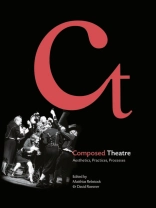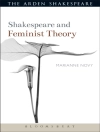A unique contribution to an emerging field, Composed Theatre explores musical strategies of organization as viable alternative means of organizing theatrical work. In addition to insightful essays by a stellar group of international contributors, this volume also includes interviews with important practitioners, shedding light on historical and theoretical aspects of composed theatre.
Spis treści
Introduction: Composed Theatre in Context – David Roesner
PART I: History and Methodology
Chapter 1: Composed Theatre: Mapping the Field – Matthias Rebstock
Chapter 2: Composition and Theatre – Roland Quitt
Chapter 3: ‘Happy New Ears’: Creating Hearing and the Hearable – Petra Maria Meyer
PART II: Processes and Practices: Work Reports and Reflections
Chapter 4: ‘It’s all part of one concern’: A ‘Keynote’ to Composition as Staging – Heiner Goebbels
Chapter 5: ‘ Theatre in small quantities’: On Composition for Speech, Sounds and Objects – Michael Hirsch
Chapter 6: … To Gather Together What Exists in a Dispersed State … – Jörg Laue
Chapter 7: From Interdisciplinary Improvisation to Integrative Composition: Working Processes at the Theater der Klänge – Jörg U. Lensing
Chapter 8: ‘ Let’s stop talking about it and just do it!’: Improvisation as the Beginning of the Compositional Process – George Rodosthenous
Chapter 9: Hearing Voices – Transcriptions of the Phonogram of a Schizophrenic: Music-theatre for Performer and Audio-visual Media – Nicholas Till
Chapter 10: Composing Theatre on a Diagonal: Metaxi ALogon, a Music-centric Performance – Demetris Zavros
PART III: Processes and Practices: Portraits and Analyses
Chapter 11: ‘Ça devient du théâtre, mais ça vient de la musique’: The Music Theatre of Georges Aperghis – Matthias Rebstock
Chapter 12: Musical Conquest and Settlement: On Ruedi Häusermann’s Theatre Work(s) – Judith Gerstenberg
Chapter 13: Composing with Raw Materials: Daniel Ott’s Music-theatre Portraits and Landscapes – Christa Brüstle
Chapter 14: Permanent Quest: The Processional Theatre of Manos Tsangaris – Jörn Peter Hiekel
PART IV: Discussion and Debate
Chapter 15: Composed Theatre – Discussion and Debate: On Terminology, Planning and Intuition, Concepts and Processes, Self-reflexivity and Communication – Edited by Matthias Rebstock and David Roesner
PART V: Discourse and Analysis
Chapter 16: ‘ It is not about labelling, it’s about understanding what we do’: Composed Theatre as Discourse – David Roesner
O autorze
David Roesner is professor of theatre and music theatre at the LMU Munich. He previously worked at the universities of Hildesheim, Exeter and Kent. Recent publications include Theatre Noise: The Sound of Performance (with Lynne Kendrick, CSP, 2011), Composed Theatre: Aesthetics, Practices, Processes (with Matthias Rebstock, Intellect, 2012) and his latest monograph Musicality in Theatre: Music as Model, Method and Metaphor in Theatre-Making (Ashgate 2014). For a full list of publications and projects, see http://mhn.academia.edu/David Roesner.












